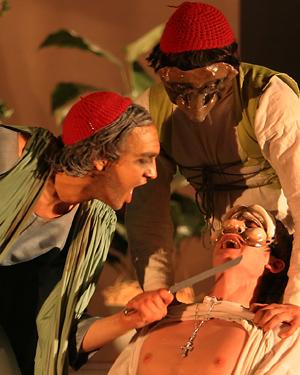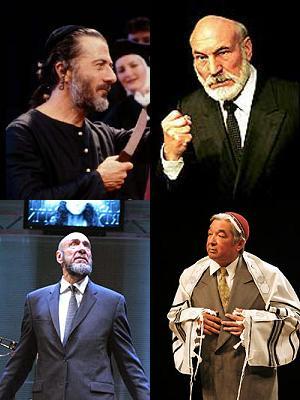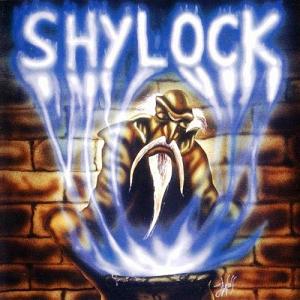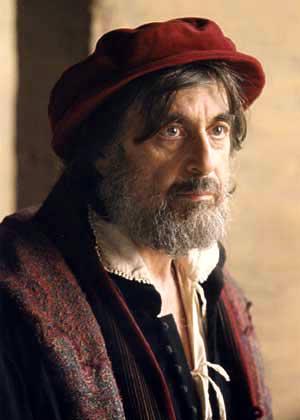On Shylock
 | | The Merchant of Venice |
Yes, I'm writing about Shakespeare, in particular the play The Merchant of Venice, and I'm not going to apologize for it either. For the heathens in my audience who aren't familiar with the play, here's a quick synopsis (those more cultured readers may skip the next two paragraphs):
A Venetian by the name of Bassanio needs three thousand ducats to travel to Belmont, visit a rich maid, Portia, and attempt to pass her dead father's unusual test so that he can marry her. In order to procure the money, he asks his merchant friend, Antonio. Antonio's money is all tied up in various endeavors oversees, but he is willing to use his credit to get three thousand ducats. Shylock, a Jewish moneylender, agrees to give the money to Antonio, but if Antonio is unable to pay him back in three months, Shylock gets to take a pound of flesh from Antonio's chest. Antonio, thinking the terms of the contract are an amusing joke and absolutely certain he'd be able to pay the money in time, seals the bond with Shylock.
Bassanio wins the hand of Portia, but at the same time, Antonio's various investments fall apart and he defaults on his loan to Shylock. Shylock, embittered by the loss of his daughter and the way he is treated in Venice, demands his pound of flesh, even after Bassanio returns with ten times the amount of the original loan to pay him with. It goes to court, where a disguised Portia rules that Shylock can get his pound of flesh, but would lose all of his money if he drops a single drop of Antonio's blood. As Shylock tries to leave without his pound of flesh, Portia adds to the ruling that, because Shylock ("an alien") indirectly tried to kill Antonio ("a Christian"), his entire estate is forfeit. Antonio is willing to let Shylock keep half his fortune, as long as he agrees to become a Christian. Shylock, utterly defeated, has no choice but to agree. Afterwards, all of our heroes meet up again in Belmont, where they laugh at their fortunes and live happily ever after.
In its day, The Merchant of Venice probably wasn't as problematic as it is today. However, something happened to Shakespeare when he created Shylock, the character that was probably the first to get out of the writer's control. Critics like to say that the "problem plays"--All's Well That Ends Well and Measure for Measure in particular--represent a turning point for Shakespeare from the romantic comedies that gave him so much early success, like The Taming of the Shrew and A Midsummer Night's Dream, to the darker tragedies that represent some of his later works, like Othello and King Lear. I tend to agree, but I think the change first took root in Shylock.
 | | Four different modern interpretations of Shylock by notable film actors (you get bonus points if you can name all four) |
Without a doubt, The Merchant of Venice, as originally performed, is a deeply antisemitic work. Any scholar who tries to convince you otherwise is mired in self-deception. Even Shylock's famous speech, which appears to be a rallying cry for equality, is not the speech about tolerance or acceptance that is usually performed today (more on that later). Shylock wasn't played as a sympathetic anti-hero until at least the early 19th Century, and few non-Jewish people thought there was anything wrong with the earlier portrayals of Shylock until the 20th. Shakespeare didn't invent the Jewish stereotypes that are so rampant in his play, and he wasn't the first playwright to craft a villain out of them. Still, many of the most detrimental modern stereotypes can be traced back to the unfortunate popularity of the original Shylock.
I'm not saying modern performances of the play should be faithful to Shakespeare's antisemitic intentions, as that would be abhorrent. However, modern audiences have a hard time rectifying a sympathetic Shylock with the tone of the play at large. The play is, at its soul, a light-hearted comedy in which Shylock is the merciless antagonist standing in the way of our Christian lovers' happy ending. If Shylock is made sympathetic, his utter destruction in the court scene is so shocking and cruel that the final act of the play cannot be staged without an overwhelming sense of awkwardness. There is no finer modern example of this than the 2004 film version with the oddly-cast Al Pacino as Shylock, which reinforces the unease by showing the defeated Shylock standing alone in the street after everyone else's happy ending.
Therefore, I think for modern performances of The Merchant of Venice, it is important for actors to strike a balance between an offensive stereotypical villain and a tragic anti-hero. There are subtle ways to handle this delicate problem. For instance, there is the minor character of Tubal, who is also Jewish. If Tubal is played as someone who disapproves of Shylock's villainy, that can offset some of the play's antisemitism by reminding the audience that Shylock is not representative of all Jewish people. This isn't a complete solution to the problem, of course, but with many such tweaks, a masterful director and a talented cast can save the play from its modern-day uncomfortableness.
 | | Fun fact: Shylock is also the name of a German rock band, and German portrayals of Shakespeare's Shylock in the last hundred years aren't known for their cultural sensitivity |
Though nobody should try to read Shakespeare's mind, it's possible that Shakespeare could sense this discomfort in his finished play. It is incredibly doubtful he was sensitive to antisemitism, but in his concrete need to give each of his characters a nuanced and multi-dimensional motivation--something no writer had truly had before--Shakespeare crafted the sympathetic aspects of Shylock that modern performances exploit so heavily. In making Shylock sympathetic, however, he created a character for which a satisfying resolution was impossible. This was, therefore, Shakespeare's first significant problem, and it set the stage for his maturation as a writer.
This is a crucial point, because as Harold Bloom points out in his definitive text, Shakespeare: The Invention of the Human, it explains why Shakepeare threw in the apparently sadistic conversion to Christianity. Ironically, he probably added it to make his ending less awkward, because he couldn't have given his other characters a happy ending with Shylock still lurking in the shadows. It's even possible that Shakespeare thought the conversion was a way to redeem his villain, to get Shylock out of the trap of being a moneylender (one of the only professions available to Jews in late 16th Century Venice). Either way, Shakespeare had to force his character to change, even though he had crafted a character who's most defining characteristic is intransigence.
Most scholars agree that Shylock is Shakespeare's answer to Barabas, the Jewish villain in Christopher Marlowe's play, The Jew of Malta. Early in The Merchant of Venice, Shylock does indeed appear to be a simple villain without much in the way of sympathetic motivation, in the same vein as Barabas. However, in Act III, Scene 1, when he finally sets his mind to claiming Antonio's pound of flesh, Shylock gives his famous speech:
He hath disgraced me, and hindered me half a million; laughed at my losses, mocked at my gains, scorned my nation, thwarted my bargains, cooled my friends, heated mine enemies, and what's his reason? -- I am a Jew. Hath not a Jew eyes? Hath not a Jew hands, organs, dimensions, senses, affections, passions; fed with the same food, hurt with the same weapons, subject to the same diseases, healed by the same means, warmed and cooled by the same winter and summer as a Christian is? If you prick us do we not bleed? If you tickle us, do we not laugh? If you poison us do we not die? And if you wrong us shall we not revenge? If we are like you in the rest, we will resemble you in that. If a Jew wrong a Christian, what is his humility? Revenge. If a Christian wrong a Jew, what should his sufference be by Christian example? Why, revenge. The villainy you teach me I will execute, and it shall go hard but I will better the instruction.
 | | There are several problems with the 2004 film version of The Merchant of Venice, but Pacino's rendition of the famous speech is not one of them |
This speech is the exact moment where Shakespeare began to change, where readers and audiences can actually see Shakespeare turning into the greatest writer who ever lived. While most modern audiences interpret this speech as a call for equality and tolerance, which from a certain point of view it is, it is actually more a plea for the lowest common denominator. Shylock's motivation is perfectly understandable in context; it has already been established that Shylock has been treated poorly by the Christians on the Rialto, Antonio in particular, who mocked and spit on him on a regular basis and promised to continue doing so in the future. Therefore, Shylock has every right to be angry and bitter, but when he gives his speech, he is not trying to evoke sympathy; he is trying to rationalize his bloodlust.
It is a mistake to perform this speech imploringly as many modern actors do, because evaluated in context, it should be given angrily. The 2004 Al Pacino film, which contains one of the most sympathetically-skewed Shylocks in recent memory, actually nails it. Pacino's Shylock is enraged and reacting to the implication that he has no right to take his pound of flesh. He is justifying his violent intentions, not begging for cross-cultural understanding. Still, even if played the way Pacino plays it, one can't deny that the plea for equality can be found in the text of the speech itself.
Late in the play, during the court scene, Shylock makes a similar speech where he argues that he should have the right to own Antonio's flesh because Christians have the right to own slaves. Ignoring the inherent irony of invoking slavery to make a point about community, Shylock's speech, just like his "Hath not a Jew eyes" speech, does indeed make a good point that resonates very strongly with modern audiences who are sensitive to issues of race and religious tolerance. It is hard to believe that Shakespeare could be unaware of the implications.
Not only did Shakespeare stumble upon a problem that was hundreds of years ahead of its time, but he also created the first character that needed to be wrestled with in order for Shakespeare to end the play the way he wanted to end it. It would be several years before Shakespeare would ignore genre conventions, let go of his characters, and find that doing so leads to more satisfying dramatic resolutions. However, Shylock likely taught him lessons that would inform his writing while struggling with Hamlet and Macbeth. Without Shylock and all the masterful characters that followed, far fewer of us would know about Shakespeare today, and modern drama, both written and staged, would be missing its most important influence.
-e. magill 11/30/2010
|
|